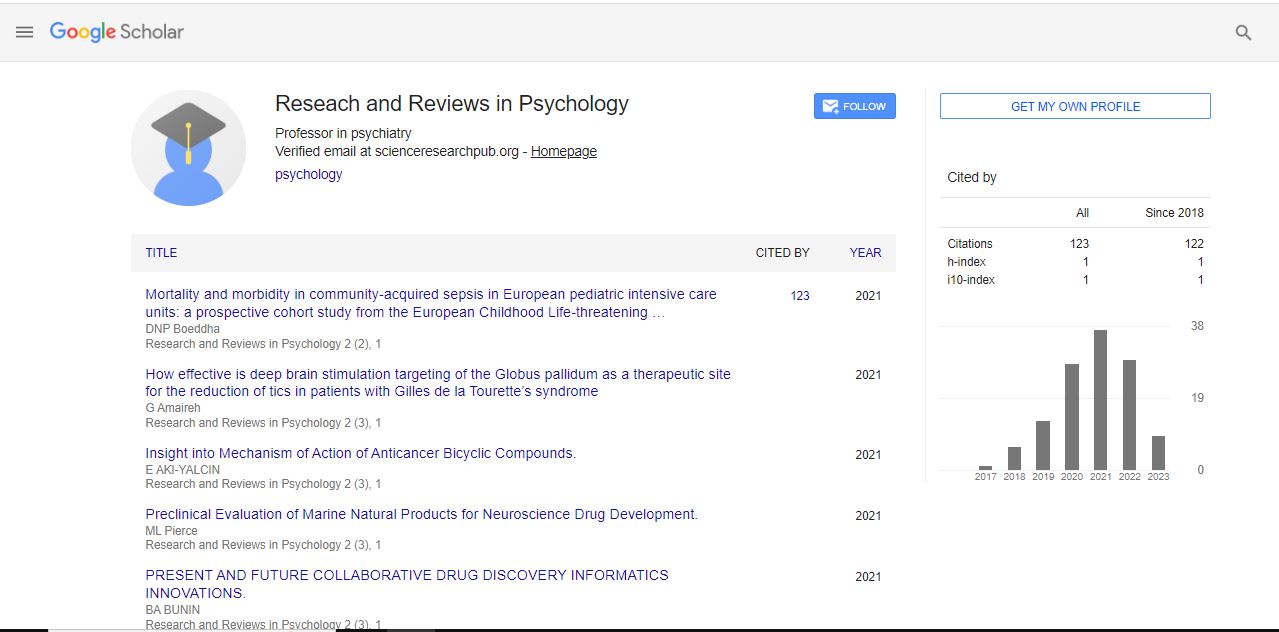Commentary, Res Rev Phys Vol: 4 Issue: 3
Mechanism of Clinical Psychology and its Therapeutic Methods
Grocott Sommer*
1Department of Psychology, University of Manitoba, Winnipeg, Canada
*Corresponding Author: Grocott Sommer,
Department of Psychology, University
of Manitoba, Winnipeg, Canada
E-mail: sommer.g@gmail.com
Received date: 02 September, 2023, Manuscript No. RRPY-23-117752;
Editor assigned date: 04 September, 2023, PreQC No. RRPY-23-117752 (PQ);
Reviewed date: 18 September, 2023, QC No. RRPY-23-117752;
Revised date: 25 September, 2023, Manuscript No. RRPY-23-117752 (R);
Published date: 05 October, 2023 DOI: 10.4172/rrpy.1000347.
Citation: Sommer G (2023) Mechanism of Clinical Psychology and its Therapeutic Methods. Res Rev Phys 4:3.
Description
Clinical psychology is a compassionate and dynamic field that plays an important role in understanding and addressing mental health challenges. It focuses around the study, assessment, and treatment of psychological disorders, providing support, guidance, and therapeutic interventions to individuals facing emotional and mental difficulties.
Clinical psychology is a branch of psychology focused on the assessment, diagnosis, and treatment of psychological disorders and emotional issues. Clinical psychologists work in various settings, including private practices, mental health clinics, hospitals, and academic institutions. They employ evidence-based therapeutic techniques to help individuals enhance their mental well-being and address psychological distress.
Principles of clinical psychology
Clinical psychology operates on several core principles:
Scientific foundations: Clinical psychology is completely established in scientific research and evidence-based practice. It integrates psychological theory and empirical findings to inform clinical assessments and interventions.
Ethical standards: Ethical guidelines and standards of behavior are essential components of clinical psychology practice. These standards ensure the well-being and rights of clients are maintained, including issues of confidentiality, informed consent, and professional boundaries.
Cultural competence: Clinical psychologists are committed to understanding and respecting the cultural, ethnic, and diversity-related factors that can impact an individual's psychological well-being. Cultural competence is essential in providing effective and sensitive care.
Client-centered approach: Clinical psychology emphasizes the client's needs and well-being. A client-centered technique fosters collaboration and a therapeutic alliance between the psychologist and the client.
Assessment and diagnosis: Clinical psychologists are trained to assess and diagnose psychological disorders using standardized assessment tools. This process forms the basis for treatment planning.
Therapeutic approaches in clinical psychology
Clinical psychology encompasses various therapeutic techniques to address the diverse needs of clients. Some of the most prominent therapeutic orientations include:
Cognitive-Behavioral Therapy (CBT): CBT is a widely practiced therapeutic technique that focuses on identifying and modifying negative thought patterns and behaviors. It is effective in treating various conditions, including anxiety, depression, and phobias.
Psychodynamic therapy: Psychodynamic therapy explores unconscious processes, unresolved conflicts, and early life experiences that may influence current behavior and emotional difficulties. It is based on Sigmund Freud's opinions.
Humanistic and existential therapies: These therapies emphasize personal growth, self-actualization, and the exploration of life's meaning. Humanistic techniques, such as client-centered therapy, aims to help individuals become more self-aware and authentic.
Family systems therapy: Family systems therapy examines the dynamics and interactions within a family to understand and address issues that affect individual family members. It is particularly useful for treating relationship problems and family-related stress.
Interpersonal Therapy (IPT): IPT is a time-limited therapy that targets interpersonal difficulties, aiming to improve communication, interpersonal relationships, and coping abilities. It is effective for mood disorders and eating disorders.
Behavioral therapy: Behavioral therapy focuses on observable behaviors, aiming to identify and modify maladaptive behaviors through conditioning, reinforcement, and learning principles. It is useful for conditions such as phobias, obsessive-compulsive disorder, and substance abuse.
Group therapy: Group therapy involves multiple individuals receiving therapy in a group setting, allowing for shared support, feedback, and the opportunity to work through interpersonal issues.
Clinical psychology in practice
Clinical psychology plays a significant role in various settings and applications:
Individual therapy: Clinical psychologists work with individuals, providing one-on-one therapy to address a wide range of issues, including anxiety, depression, trauma, and substance abuse.
Assessment and diagnosis: Clinical psychologists conduct assessments to diagnose psychological disorders, using standardized psychological tests, interviews, and observation. This information informs treatment planning.
Child and adolescent psychology: Clinical psychologists frequently specialize in working with children and adolescents, addressing developmental and behavioral issues, as well as childhood disorders such as ADHD and autism.
 Spanish
Spanish  Chinese
Chinese  Russian
Russian  German
German  French
French  Japanese
Japanese  Portuguese
Portuguese  Hindi
Hindi 